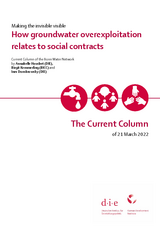Making the invisible visible
How groundwater overexploitation relates to social contracts
Houdret, Annabelle / Birgit Kemmerling / Ines DombrowskyThe Current Column (2022)
Bonn: German Development Institute / Deutsches Institut für Entwicklungspolitik (DIE), The Current Column of 21 March 2022
The theme of this year’s United Nations World Water Day on 22 March is “Groundwater – Making the Invisible Visible”. With rivers becoming increasingly polluted or drying up more frequently, groundwater is presumed to be a secure source for domestic, industrial, energy-related and agricultural use. However, in the water-scarce Middle East and North Africa (MENA) region, which is at the same time being severely impacted by climate change, this source is also at particular risk of running dry. The region has the world’s highest rates of groundwater use/overexploitation and is also experiencing rising levels of water pollution from sewage and salt water intrusion. Irrigated agriculture in particular poses an enormous risk to many of the region’s aquifers.
Previous approaches are insufficient
Frequent attempts are made to find technical solutions to the groundwater crisis. Aquifers can be refilled with treated wastewater or water from storm surges, for instance, or water-saving and wastewater-treatment technologies can be employed to reduce consumption. Satellite monitoring of land-use change can help to identify sources of pollution and overexploitation or aid with the collection of usage-based water charges. The latter form part of economic solutions, such as those being implemented in Jordan’s Highlands and Azraq Oasis, whereby charges are levied to incentivise the efficient use of water.
Institutional reforms to protect and maintain groundwater resources are also being initiated in many places. Vulnerable drinking water catchment areas are being closed to use, and licences are being required for the construction and utilisation of wells. Additionally, the Moroccan Government, for instance, has worked with different user groups to draw up aquifer contracts, containing binding rules on the user of groundwater, in different regions of the country.
Despite these initiatives, groundwater extraction is on the rise in the region. Charges are often too low in order to influence consumption patterns and are not collected consistently enough. A lack of transparency concerning the issuing of well licences and inadequate monitoring of those licences are also increasing extraction in many regions. Moreover, the differing interests of the relevant stakeholders hinder enforcement of the contracts. For example, it may not be possible to implement resource conservation among politically influential farmers. This shows that the overexploitation of groundwater resources in the MENA region is a political issue.
Water equals power
In the MENA region especially, water is closely associated with the corresponding social contracts. These are implicit agreements between the government and its citizens, whereby the state secures its legitimacy and the loyalty of the public by providing specific services, ensuring security and, in some cases, facilitating political participation.
It is precisely because groundwater resources allow farming to continue in many countries despite drought and climate change and at the same time supply rapidly growing cities with drinking water that they form a key pillar of social contracts. If governments cannot safeguard the water supply for their populations or protect their citizens from the negative impact of water scarcity, drought and flooding, then they have failed to fulfil their responsibility under the social contract and face the risk of protests by smallholders, for instance, whose livelihoods depend on access to water.
At the same time, social contracts also affect the way that groundwater is governed. Influential farmers and agricultural enterprises that grow lucrative products for export often play a central role in the social contract. They are political elites or have a strong lobby to push through their interests and secure access to resources or discounts on water fees. Consequently, initiatives limiting water extraction, which are urgently required to protect the environment, are barely enforced in many countries within the region.
There is thus a need for society-wide debates about how the MENA countries intend to manage their finite and overexploited water resources in the medium and long term. This requires that national governments, civil-society players, the private sector and the development cooperation community take account of and redefine the relationship between water and social contracts. How can political loyalty be decoupled from the distribution of water and more closely aligned with the principles of good governance? This also includes a discussion of which economic sectors should be expanded and which ones should be slimmed down. It is key that such a transition be undertaken in an environmentally friendly and socially responsible manner. Unless consideration is given to these political (power) issues, it will not be possible to protect groundwater resources with technical and institutional solutions.
Current Column of the Bonn Water Network.
About the Authors:
Dr. Annabelle Houdret is a Political Scientist and Senior Researcher in the Research Programme “Environmental Governance”.
Dr. Birgit Kemmerling is Geographer and Senior Researcher in the Bonn International Centre for Conflict Studies (BICC).
Dr. Ines Dombrowsky is an Economist and Head of the Research Programme “Environmental Governance”.



